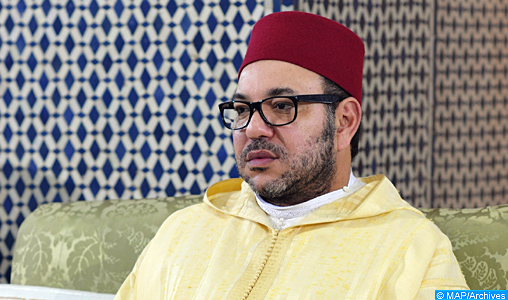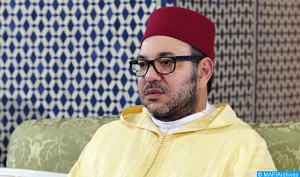Eurasia Review
by Said Temsamani
The Moroccan Press Agency MAP reported that King Mohammed VI, Commander of the Faithful, will chair, Monday in Casablanca, a religious evening to commemorate Laylat Al-Qadr, the seventh religious lecture of the holy month of Ramadan and the ceremony to announce the creation of the Mohammed VI Foundation for African Ulema, the Ministry of the Royal Household, Protocol and Chancellery said Sunday.
The religious evening, which will take place in Hassan II Mosque in Casablanca, will be broadcast live on the national radio and television Monday night during Al-Ichaa prayer, the ministry pointed out in a statement.
At the same day, the Sovereign will chair, at the Royal Palace in Casablanca, the seventh religious lecture of the holy month of Ramadan, which will be given by Younes Toure, university professor and member of the Council of Imams of Coast d’Ivoire, under the theme “Place of the Immaculate sunna of the prophet in Islamic law”, drawing on the verse: “Allah has revealed to you the Book and wisdom and has taught you that which you did not know. And ever has the favor of Allah upon you been great”. (Surat An-Nisaa, verse 113).
Following this religious lecture, HM the King will chair a ceremony to announce the creation of the Mohammed VI Foundation for African Ulema, during which the Minister of Endowments and Islamic Affairs, Ahmed Toufiq, will give an address.
After the increasing number of official requests for cooperation on religious matters that came from many African countries regarding the training in Morocco of their imams and preachers. King Mohammed VI has approved the creation of Mohammed VI Foundation For African Religious Scholars (Ulema). Given its expertise in religious education, the Kingdom will also support the modernization and reform of Medersas in those countries notably regarding programs, training of trainers, and textbooks.
To this end, the Sovereign has given his instructions to the Minister of Endowments and Islamic Affairs to ensure the implementation of the royal instructions in consultation with the relevant authorities of all those countries. his royal initiative reflects the historical and spiritual ties linking the peoples of sub-Saharan Africa to His Majesty the King, Commander of the Faithful, and the religious impact of the Kingdom and its commitment to the precepts of moderate, open and tolerant Islam.
In September 2013, King Mohammed VI and Malian President Ibrahim Boubacar Keita presided over the signing of an agreement to send 500 Malian imams to Morocco over the next two years for training in using Morocco’s moderate and tolerant form of Islam to help fight the spread of extremism. The first 100 imams from Mali have already traveled to Morocco for the program. The agreement marks a new step by Morocco to boost its diplomatic activity in West Africa by linking together countries’ cultural and spiritual values.
Moroccan spiritual diplomacy has been very successful in West Africa due to the country’s historic Maliki School through Sufi channels and methods of reaching worshipers in the sub-Saharan region and West Africa. The Tijaniya sufi order widely operating in West Africa was founded in North Africa during the 18th century. Other Sufi orders – including the Qadiriyya and Chadiliya orders – soon followed, gaining large numbers of devotees who identified heavily with Morocco, where the tomb of Sheikh Ahmed Tijani, the founder of the Tijaniyyah order, is buried.
Sufism attracts more young Africans because of its tolerance, due to the easy interpretation that gives to the Qur’an, its rejection of fanaticism and its embrace of modernity. Young people are the principles of” beauty” and” humanity”. Sufism balanced lifestyle that allows them to enjoy arts, music and love without having to abandon their spiritual or religious obligations. Sufi orders exist throughout Morocco. They organize regular gatherings to pray, chant and debate timely topics of social and political, from the protection of the environment and social charity to the fight against drugs and the threat of terrorism.
In addition, focusing on the universal values that Islam shares with Christianity and Judaism (as the pursuit of happiness, the love of the family, tolerance of racial and religious differences and the promotion of peace) Sufi gatherings inspire young people to engage in interfaith dialogue.
Sufism is so diffuse in Moroccan culture that its role cannot be properly understood if reduced to a sect or a sacred place. People get together to sing Sufi poetry, the primordial essence of the human being, the virtues of simplicity and the healing gifts of Sufi saints such as Sidi Abderrahman Majdub, Sidi Ahmed Tijani, and Sidi Bouabid Charki, the spiritual masters revered by peers and disciples for having attained spiritual union with God during their earthly lives.
Apparently Morocco’s religious authority – Imarat Lmouminin – is highly venerated by many Africans, whether in Mali, Senegal, Cote d’Ivoire… In all his trips in Africa, King Mohammed as Commander of the Faithful, receive all leaders of major Sufi orders. In all his trips in West Africa, he provided thousands of copies of the Quran issued by the Mohammed VI Foundation for Holy Quran Publishing to be distributed mosques and other major Muslim institutions. In short, a credible and very successful spiritual diplomacy led by the King to promote a tolerant Islam that teaches respect, love to other religions and contribute efficiently to counter all extremist voices who unfortunately seem to gain ground in some countries in West Africa.
In March 2015, King Mohammed VI inaugurated the Mohammed VI Institute for the Training of Imams, Morchidines, and Morchidates in the capital, Rabat. The religious training center that aims to instill the values of Morocco’s open, moderate form of Islam, based on the Maliki rite and Sunni Sufism, in the next generation of Muslim religious leaders (imams) and preachers (morchidines and morchidates) from across the region and the world.
The new foundation (Mohammed VI Foundation for African Ulema) will be a key element in Morocco’s ongoing efforts to promote religious moderation and tolerance as a shield against extremism in the region. The spiritual ties between Morocco and many African Sub-Saharan countries are mirrored throughout history in the exchange of muslim scholars, saints and sufis who spared no effort to spread the genuine Islamic values of tolerance and moderation.








